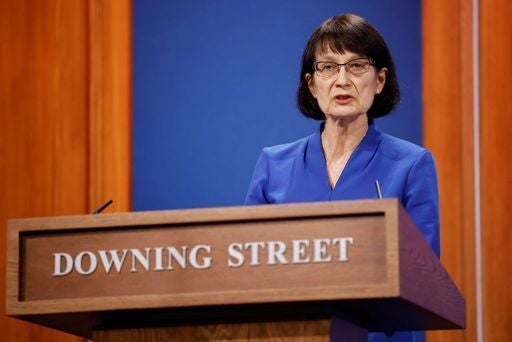UK going in wrong direction on Covid cases with ‘pockets’ of unvaccinated people, says government health chief
UK faces a ‘knife edge’ decision on ending lockdown on 21 June as coronavirus cases rise

Your support helps us to tell the story
From reproductive rights to climate change to Big Tech, The Independent is on the ground when the story is developing. Whether it's investigating the financials of Elon Musk's pro-Trump PAC or producing our latest documentary, 'The A Word', which shines a light on the American women fighting for reproductive rights, we know how important it is to parse out the facts from the messaging.
At such a critical moment in US history, we need reporters on the ground. Your donation allows us to keep sending journalists to speak to both sides of the story.
The Independent is trusted by Americans across the entire political spectrum. And unlike many other quality news outlets, we choose not to lock Americans out of our reporting and analysis with paywalls. We believe quality journalism should be available to everyone, paid for by those who can afford it.
Your support makes all the difference.The country is going in the wrong direction on coronavirus cases with pockets of unvaccinated people in some areas remaining at risk, the head of the UK’s Health Security Agency has warned.
Dr Jenny Harries, the chief executive of the new body, set up in the wake of the coronavirus crisis said it was still too early to make a decision on ending lockdown on 21 June and the next week would be crucial.
She said it was vital local health teams targeted older people who were yet to be fully inoculated against Covid-19 and praised the efforts of teams in Bolton where the rate of patients being admitted to hospitals had dropped in the past week.
The latest internal NHS data shared with The Independent showed there were now 905 Covid patients in English hospitals on Thursday, up from 879 on Wednesday.
The increase came despite 124 discharges in the last 24 hours, with 82 new admissions for Covid and 84 patients already in hospital testing positive for the virus.
In Bolton, numbers of Covid patients have risen to 40 after being below that level for the past week. Hospitals across Greater Manchester have 180 Covid patients, up from 163 on Wednesday.
The northwest region remains the worst affected with 271 Covid patients, levels not seen since April.
Speaking on a Royal Society of Medicine webinar Dr Harries said: “We are progressing, and probably as a country not quite in the right direction that we'd all want to.”
She said the government’s roadmap was created with five-week gaps to allow for the changes to take effect and to see whether it would lead to increased hospitalisations and deaths.
“This really is a knife edge decision point because the cases are rising, and I think that's becoming clearer and modelling does suggest that we would start to see a further rise not necessarily immediately but in coming weeks.
“One of the critical things here is understanding the vaccine effectiveness, and because we've had very few numbers through the robustness of the interpretation of the data on that is really quite tricky.
“We need one more week.”
She added that it was vital people came forward for their vaccines saying those aged over 60 and vaccinated were “generally just not getting ill” whereas those who were unvaccinated were being admitted to hospital.
Despite a high update of vaccine in older groups Dr Harries said there were some unvaccinated older people in parts of the country who were at risk. While she acknowledged calls for children to be vaccinated in some areas she said vaccine supply meant it was better targeted at older people.
She said: “It is really primarily important for saving lives that the older individuals who are more at risk, who have not had first and second vaccinations maximally get vaccinated.”
“There are pockets,” she said of people around the country adding: “We have had some cases of the Delta variant and in places like Bolton, for example, actually they have done magnificent work in trying to suppress some of these outbreaks. In many areas, so Sefton for example, they had an outbreak and managed to cool it down completely.
“What the Bolton approach does is allows work with local authorities who know where those pockets of the communities are to work with, for example, local faith leaders or people who are trusted to give messages out or to provide information in a way which people find easy to understand.
“It's about fitting the vaccination programme into the context of people's lives and I think that's why it's been so successful in Bolton.”
Join our commenting forum
Join thought-provoking conversations, follow other Independent readers and see their replies
Comments